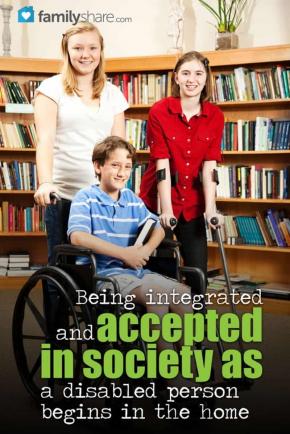
It's important that all family members support each other, but when a member of the family has a disabilty, that support is even more important. It is not easy to adjust to a disability when you become disabled later in life. It is imprinted on your memory all the things you were capable of doing before becoming disabled.
As a child, you learn to do things by repeating them over and over until you do it automatically - like tying a shoe with two hands or walking on two legs. If you lose the use of one of your limbs, you have to relearn how to do the simple tasks like feed yourself or tie your shoes with one hand. With practice, you can relearn these simple tasks, but in the meantime you may need to ask for assistance.
When you are born with a disability, you learn early on to make the ajustments necessary to be independent and take care of yourself. For people who are born able-bodied but become disabled later in life, they often find it more difficult to adjust to living with a disability. Therefore, it is important that there are family support systems in place to help the individual accept who he or she is now.
The value of support groups
When someone is injured in a car accident and left with a spinal cord injury, the hospital where they receive treatment and rehabilitation has support groups and systems to help both the individual and his or her family adjust to the disability. The support system also helps the individual learn to live with the disability and still be independent.
Every disability has an agency available for families with resources available:
American Foundation for the Blind (AFB)
They provide access to the information, technology, education and legal resources that disabled people need to live independent and productive lives. AFB has also designed, manufactured and sold numerous assistive technology products, such as braille writers, magnifiers, and audio blood pressure monitors.
AFB Headquarters 2 Penn Plaza, Suite 1102 New York, NY 10121 Tel: (212) 502-7600 Fax: (888) 545-8331
National Association for the Deaf (NAD)
The advocacy scope of the NAD includes areas of early intervention, education, employment, health care, technology, telecommunications and youth leadership. The NAD also carries out its federal advocacy work through coalition efforts with specialized national deaf and hard of hearing organizations, as well as coalitions representing national cross-disability organizations.
National Association of the Deaf 8630 Fenton Street, Suite 820 Silver Spring, MD 20910
TTY
: 301.587.1789 Voice/VP: 301.587.1788 or 301.328.1443
United Cerebral Palsy (UCP)
Educates, advocates and provides support services to ensure a life without limits for people with a spectrum of disabilities surrounding Cerebral Palsy.
1825 K Street NW, Suite 600 Washington, DC 20006 t. 1.800.872.5827 / 202.776.0406 f. 202.776.0414
National Head Injury Foundation
This agency has local chapters in each state that provides support to families and individuals who have suffered head injuries.
National Spinal Cord Injury Foundation (NSCIA)
Helps people who have spinal cord injuries become independant and improve the quality of their life.
These are just a few agencies that serve those with disabilities.
There always needs to be good communication within a family - especially if one member of the family is disabled. Don't assume that you know what that individual needs, ask first. Find support groups with families that have similar experiences and attend regularly. These groups can help you learn to adapt to lifestyle changes so you don't get overwhelmed. Whether you are dealing with someone who was born with a disability or someone who became disabled later in life, the theory is the same. You need to let that individual tell you how you can help. It is disrespectful to just assume that you know what the person needs. It doesn't matter what the disability is, each individual's needs are different. This is why it's important to ask the individual specifically what he or she needs help with.
If parents accept the child with a disability, it is easier for the siblings to be supportive as well. When the individual has a high self-esteem and self image, it is easy to go out into the world and have good relationships with others. If a disabled person has a low self esteem, he or she may go out into the world with a negative attitude and exibit bad behavior. This could result in negative interactions with other people which perpetuates their low self esteem.
If everyone learns to accept people with disabilities and assist them with integration into society, we would have a much better society all around. We all depend on each other in life, whether you are disabled or not.
Whenever the public hears about a disaster they all rush out to help the victims at that moment. However, people forget that when they're gone, those individuals still have to go on with their lives. Changing peoples' attitudes about disabilities starts in the family and then as family members go out into society, they can help educate the public as well.

